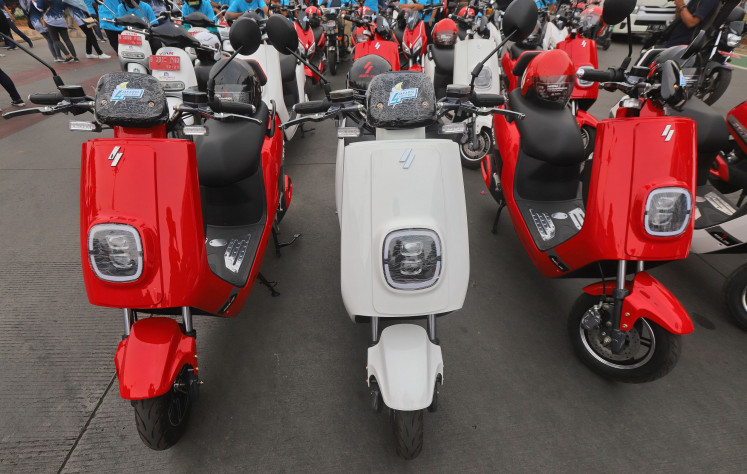Carmakers lower sales targets on gloomy outlook
Auto manufacturers have scaled back their full-year sales targets, an association has said
Change text size
Gift Premium Articles
to Anyone

A
uto manufacturers have scaled back their full-year sales targets, an association has said.
Sales are now targeted to reach between 1 million and 1.1 million units for the whole of 2015, down by 16.67 percent from the initial target of 1.2 million units , according to the latest projection issued by the Indonesian Automotive Manufacturers Association (Gaikindo).
The pessimistic outlook follows a lower-than-expected result seen in the first quarter of this year, with car sales, a key indicator of domestic consumption in Southeast Asia's largest economy, plunging by 14.05 percent to 282,345 units .
Weakening purchasing power triggered by economic slowdown was the primary factor behind the dampened hopes, Gaikindo chairman Sudirman Maman Rusdi said on Thursday.
Indonesia's economy grew by less than 5 percent in the first quarter, the lowest pace in six years, economists have predicted. The official quarterly growth figure will be issued by the Central Statistics Agency (BPS) early next week.
'Sales of passenger cars may remain low on reduced purchasing power, although the demand is still there,' Sudirman said.
Many would-be car buyers, 75 percent of whom rely on leasing firms, have recently requested extensions of credit periods to five years from the standard three, a sign of reduced purchasing power.
Decline might also be seen in sales of commercial vehicles, used widely in mining sites and plantations, as commodity prices remained depressed, Sudirman further said.
Shrinking sales of commercial vehicles hampered national vehicle sales last year, which fell by 1.8 percent to 1.21 million units, the first drop in five years.
Meanwhile, in line with the predicted decrease in vehicle sales, autoparts and components manufacturers are scrambling for new strategies.
Indonesian Automotive Parts and Components Association (GIAMM) chairman Hamdhani Dzulkarnaen Salim said that most autoparts and components makers would shift their focus to the after-sales market to cope with potential slumping demand from original equipment manufacturers (OEMs) such as Toyota, Daihatsu, Suzuki, Honda and Mitsubishi, although they might see their entire production capacity in Indonesia break 2 million units this year.
'That's the only choice. If we rely solely on OEMs, we will follow the downward trend,' he told The Jakarta Post on the sidelines of an automotive workshop at the Industry Ministry.
Last year, autoparts and components generated Rp 27 trillion (US$2.08 billion) in revenue for producers like PT Astra Otoparts, PT Gajah Tunggal, PT Indo Kordsa and PT Prima Alloy Steel Universal.
Autoparts and components manufacturers, which now top 1,500 firms, are struggling with the impact of the weak rupiah on raw material imports and business loans.
Raw materials make up between 30 and 50 percent of production costs, while more than half of the materials needed by local autoparts and component makers are sourced from overseas.









